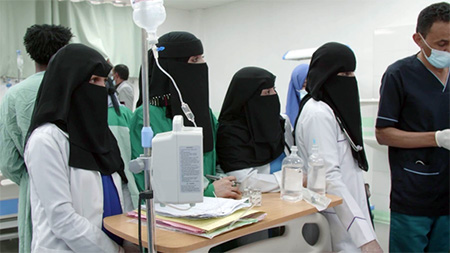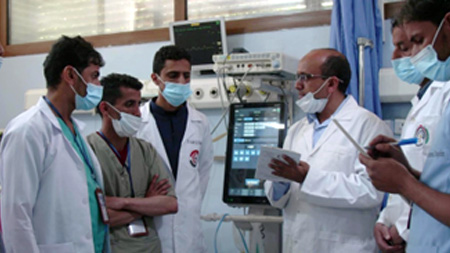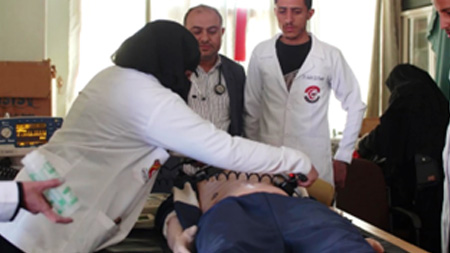 Sana’a, 15 January 2023 – The COVID-19 pandemic drew attention to weaknesses in critical and intensive care capacities in Yemen and other countries. To ensure hospitals are better equipped to meet these needs in the future, WHO and the authorities in Yemen, with support from the World Bank, are working hard to strengthen the health system and to build back better as part of the Yemen COVID-19 Response Project (YCRP).
Sana’a, 15 January 2023 – The COVID-19 pandemic drew attention to weaknesses in critical and intensive care capacities in Yemen and other countries. To ensure hospitals are better equipped to meet these needs in the future, WHO and the authorities in Yemen, with support from the World Bank, are working hard to strengthen the health system and to build back better as part of the Yemen COVID-19 Response Project (YCRP).
In June 2022, WHO launched a nine-week National Critical Care Training (NCCT) in Aden to build specialized skills among 48 doctors and nurses. The second cohort of this training recently concluded in Sana’a, bringing together 70 health workers (29% female) (28 doctors and 52 nurses) from public hospitals in 10 northern governorates.
 The participants were selected through a competitive process, with a written test administered by WHO. Following this, the selected participants underwent a pre-course test, where the average score was 45%. Half way through the course, already there was a noticeable improvement in participant skills and knowledge, with the mid-term exam average score of 73%. By the end of the course, the final test score average had increased once more to 80%.
The participants were selected through a competitive process, with a written test administered by WHO. Following this, the selected participants underwent a pre-course test, where the average score was 45%. Half way through the course, already there was a noticeable improvement in participant skills and knowledge, with the mid-term exam average score of 73%. By the end of the course, the final test score average had increased once more to 80%.
WHO Representative to Yemen, Dr Adham Rashad Ismail Abdel Moneim explained the importance of the training: “the NCCT uses an intensive and hands-on approach to teach frontline health workers life-saving skills. We are now planning to integrate this course into university curricula in Yemen, so that new graduates coming into hospitals, will have these vital competencies.”
One of the participants in Sana’a, Dr Naseer Al-Fahd, an emergency and intensive care physician at Al-Hazm Hospital, who has been practicing in the field for two years, shared his experience: “throughout the two months of the training, we have learned a lot theoretically and practically. We took the new knowledge back with us to our cities, and we were able to practice our skills… A while ago, we received a man who was injured in a car crash. His head and stomach were severely injured, and we had to act quickly. Based on the training we had, we started with securing his airway, stabilizing his blood pressure, conducting an E-FAST, as well as providing him with advanced trauma life support. This training helped us improve our skills to provide better services for patients.”
 To maximize the impact of the NCCT, WHO will continue working with the World Bank under the Emergency Human Capital Project (EHCP) to integrate key learning areas from the course into university curricula. WHO will also support the cascading of basic and advanced life support training so that frontline health workers in all governorates of Yemen have the needed know-how to save lives.
To maximize the impact of the NCCT, WHO will continue working with the World Bank under the Emergency Human Capital Project (EHCP) to integrate key learning areas from the course into university curricula. WHO will also support the cascading of basic and advanced life support training so that frontline health workers in all governorates of Yemen have the needed know-how to save lives.
Related link
Building a specialized cadre of doctors and nurses to save lives in Yemen








